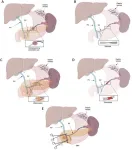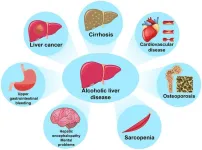(Press-News.org) People who are severely overweight (obese) not only exhibit altered risk behavior, but also changes in their metabolism and psyche. It was previously assumed that severely obese people are more impulsive and show an increased willingness to take a risk. Scientists from the DZD partner German Institute of Human Nutrition Potsdam-Rehbrücke (DIfE) have now investigated whether massive weight loss leads to an improvement in metabolic and psychological states and whether decision-making is improved. The results were published in the journal 'Clinical Nutrition'.
Being overweight can cause metabolism to slip
Our behavior depends on many factors. On the one hand, it is an expression of our personality, but it is also controlled by internal signals, such as glucose metabolism and our mood. Studies have shown that people with obesity are influenced by these factors in a completely different way. Glucose metabolism and mood are impaired in this case and therefore do not provide signals that form a reliable basis for taking decisions any longer.
Beatrix Keweloh, a doctoral student in the Department of Neuroscience of Decision and Nutrition, and her team investigated in an intervention study whether this condition can be reversed by massive weight loss. They recruited 62 test subjects aged between 18 and 75 with severe obesity (BMI > 35 kg/m2) and prescribed them an intensive 10-week diet with a daily energy intake of 800 kilocalories. At the beginning and end of the intervention, the participants' weight and body fat were measured, their mood was recorded using a questionnaire and their willingness to take a risk was determined using a computer-based test.
Role of the long-term sugar level HbA1c
As expected, after the 10-week diet there was a significant reduction in the body mass index (BMI) and the HbA1c level as a marker for glucose metabolism, as well as a significant improvement in mood. In addition, the scientists were able to demonstrate a positive change in behavior, as the weight loss led to risk-avoiding decisions. Accordingly, risk behavior in obesity appears to be highly dependent on the BMI. “Our results have also shown that the metabolic factor HbA1c becomes the leading predictor of risk-taking after weight loss,” says first author Beatrix Keweloh.
The study also showed that mood loses its influence on decision-making after weight loss. The participants' risk behavior was therefore more strongly influenced by metabolic signals than by emotional ones. “We have shown that weight loss has a positive effect on glucose metabolism and mood and, in particular, that it is possible to restore the function of glucose metabolism as a control signal,” summarizes Keweloh.
© DIfE
Promotion of metabolically driven decisions
The study reveals that there are complex interactions between weight loss as well as metabolic and psychological factors with regard to risk-taking. The BMI seems to play a central role. As a reduced willingness to take a risk is associated with a healthier lifestyle, it is an important prerequisite for weight loss and maintaining a healthy body weight.
Accordingly, intervention strategies to support weight management should consider both metabolic and psychological factors to prevent relapse into unhealthy behaviors and promote metabolically driven decisions.
“This study is one of the first of its kind because it takes into account both metabolic and psychological factors in overweight people,” summarizes Prof. Soyoung Q Park, Head of the Department of Neuroscience of Decision and Nutrition. “It therefore provides an important contribution to research in this field. On the other hand, it shows that we are only at the beginning and need to do more research to understand exactly how energy balance and psyche affect our decisions.”
Background information
Prevalence of obesity
The number of people with obesity, i.e., severe overweight, has risen rapidly in recent years. According to a study published in the British journal “Lancet,” more than one billion people are affected – out of a global population of around eight billion. According to data from the Federal Statistical Office, around 42 percent of women and around 62 percent of men in Germany are overweight to obese. According to the World Health Organization (WHO), people with a BMI of 25 or more are classified as overweight and 30 or more as obese.
Willingness to take a risk
There are various established paradigms for testing the willingness to take a risk. One possibility is computerized lottery tasks. In this study, a conventional lottery task was used in which the participants had to make a series of decisions between two options in which they could win money. The first option was a fixed amount of money. The second option offered the possibility of receiving a higher or lower amount, with the probability of winning being 50 percent in each case.
Original publication:
Keweloh, B., Terenzi, D., Froehlich, E., Coricelli, C., Stürmer, P., Rohmann, N., Wietzke-Braun, P., Beckmann, A., Laudes, M., Park, S. Q.: Weight Loss Impacts Risky Decisions in Obesity. Clin. Nutr. 43(6), 1270-1277 (2024). [Open Access]
Scientific Contact:
Beatrix Keweloh
PhD student in the Department of Neuroscience of Decision and Nutrition
Phone: + 49 33 200 88 - 2518
E-Mail: beatrix.keweloh(at)dife.de
Press Contact:
Press and Public Relations at the DIfE
Phone: 033 200 88 - 2335
E-Mail: presse(at)dife.de
END
The winners of the 2024 EurekAlert! Travel Awards are Pavla Hubálková, a Czech science journalist at WIRED.CZ, and Iris Duțescu, a Romanian freelance science journalist.
An independent panel of three judges with regional science journalism expertise selected the winners. Both awardees will receive travel support from EurekAlert! to attend the 2025 Annual Meeting of the American Association for the Advancement of Science (AAAS) in Boston, Mass., where they will have opportunities to cover the latest scientific research and make connections with scientists ...
Splenic venous hypertension (SVH), also known as left-sided portal hypertension, is a rare condition characterized by upper gastrointestinal (GI) bleeding in the absence of liver disease. This condition arises due to increased pressure in the splenic vein (SV), causing blood to drain through the short gastric veins to the stomach, leading to the dilation of submucosal structures and the formation of gastric varices. Unlike traditional portal venous hypertension (PVH), SVH does not involve elevated pressures in the main portal vein and is primarily an extrahepatic condition. Diagnosing SVH requires ...
"With the method we developed, we can make things visible that no one has seen before," says Prof. Sebastian Loth, Managing Director of the Institute for Functional Matter and Quantum Technologies (FMQ) at the University of Stuttgart. "This makes it possible to settle questions about the movement of electrons in solids that have been unanswered since the 1980s." However, the findings of Loth's group are also of very practical significance for the development of new materials.
Tiny changes with macroscopic consequences
In ...
A fiery orange bat, its wings folded and tiny teeth forever bared on its fuzzy face, is mounted inside a 6-inch, black coffin. Its retail price: $59. Or, for $140, you can get one framed with its black and orange wings spread, deliverable in two days.
Despite declining numbers in the wild, hundreds of specimens like this of Kerivoula picta—or painted woolly bat—are being sold on Etsy, eBay and Amazon as jewelry, Halloween decorations, and jarred curios.
A study published July 9 in the European Journal of Wildlife Research found “abundant evidence that ...
AMHERST, Mass. – Informal political polls conducted on X/Twitter during both the 2016 and 2020 U.S. presidential elections were significantly skewed by questionable votes, many of which may have been purchased from troll farms. This conclusion, reached by a team of scientists led by Przemyslaw (Przemek) Grabowicz, research assistant professor at the University of Massachusetts Amherst, shows that X/Twitter’s poll system deliberately reports biased public vote counts. On average, the results of such questionable polls favored Donald Trump over Joe Biden, 58% to 42% in a head-to-head comparison, during 2020.
The team additionally found that ...
An international research collaboration, led by Prof. Dr. Robert Grosse (Centre for Integrative Biological Signalling Studies and Institute of Clinical and Experimental Pharmacology and Toxicology, University of Freiburg), Dr. Libor Macurek (Institute of Molecular Genetics, Czech Academy of Sciences, Prague) and Dr. Zdenek Lansky (Institute of Biotechnology, Czech Academy of Sciences, Prague) has uncovered a new mechanism of the crosstalk between microtubules and actin cytoskeleton during cell division and ...
Alcoholic liver disease (ALD) is a major cause of liver-related morbidity and mortality globally. Chronic alcohol consumption, a primary driver of ALD, leads to a spectrum of liver conditions ranging from fatty liver to cirrhosis and hepatocellular carcinoma. In China, the incidence of ALD has been rising at an alarming rate, reflecting the country's rapid economic growth and changing social norms around alcohol consumption. This paper explores the complex social factors influencing ALD in China, the complications ...
Foreign direct investments (FDI) in tropical countries in extractive industries like mining, logging and fossil fuels have a long, environmentally destructive track record in tropical countries. Are FDI in food systems another extractive industry?
Highlights:
Foreign direct investment (FDI) in food systems are a major contributor to deforestation in tropical countries, an advanced machine learning model shows
Laws requiring deforestation-free exports are welcome but likely address only a fraction of forest loss potentially linked to FDI in food systems in domestic markets
Better regulation of FDI in domestic food production is needed to save more forest ...
SEATTLE – Everybody poops, but not every day. New research by the Institute for Systems Biology (ISB) suggests bowel movement frequency is linked to long-term health.
An ISB-led research team examined the clinical, lifestyle, and multi-omic data of more than 1,400 healthy adults. How often people poop, they found, can have a large influence on one’s physiology and health. Their findings will be published in the Cell Reports Medicine on July 16.
Researchers explored data from consenting participants of the consumer wellness company Arivale. The ...
Hormone modulating therapy (HMT) used for the treatment of breast cancer was associated with a 7% lower risk of developing Alzheimer’s disease and related dementias later in life, according to a new study published today in JAMA Network Open.
The study, which is one of the largest of its kind, found that although HMT was linked with protection against the development of dementia overall, the association decreased with age and varied by race.
“Our findings emphasize the importance of being cognizant of individual patient factors when we prescribe medications or develop treatment plans for breast cancer,” said senior author Francesmary Modugno, Ph.D. M.P.H., ...







